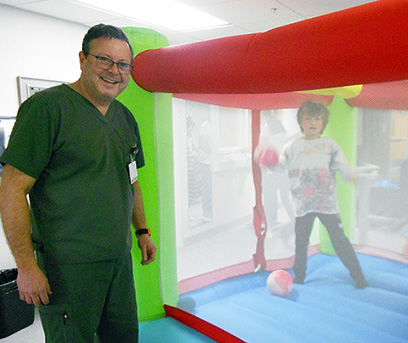Occupational Therapy
Our services improve your health, well-being, functional abilities and independence.
What is occupation?
Occupations are the activities people of all ages need and want to do—things like making meals, dressing, managing medications, driving, going to school or work, playing, or caring for family members.
Occupational therapy is a science-driven, evidence-based profession that enables people of all ages to participate in daily living or live better with injury, illness, or disability. This is accomplished through designing strategies for everyday living and customizing environments to develop and maximize potential.
By taking the full picture into account—a person's psychological, physical, emotional, and social make-up—occupational therapy assists people in:
- Achieving their goals
- Functioning at the highest possible level
- Concentrating on what matters most to them
- Maintaining or rebuilding their independence
- Participating in the everyday activities that they need to do or that simply make life worth living.
Occupational therapists and occupational therapy assistants help people participate in their desired occupations with the therapeutic use of everyday activities, based on the client's personal interests and needs.
Occupational therapy (OT) considers the complex relationship between the client, the activity, and the environment in which the activity takes place. Examples of OT interventions include:
- helping a child with a disability to participate fully in school and social situations,
- assisting an injured worker to regain skills they need to function in their job, or
- providing supports to older adults experiencing cognitive or physical changes.
What do occupational therapy services include?
Services focus on the client's goals and typically include:
- an individualized evaluation, during which the client/family and occupational therapist determine the person’s goals,
- customized interventions to improve the person’s ability to perform daily activities and reach the goals, and
- an outcomes evaluation to ensure that the goals are being met and/or make changes to the intervention plan.
OT services may also include comprehensive evaluations of the client’s home and other environments (e.g., workplace, school), recommendations for adaptive equipment and training in its use, and guidance and education for family members and caregivers.
WHAT OCCUPATIONAL THERAPISTS (OT) DO
Various health issues can pose barriers to participating in daily activities. Occupational therapists help people:
- Learn new ways of doing things
- Regain skills and develop new ones
- Use materials or equipment that makes life easier
- Adapt their environment to work better for them
These solutions help people do as much as they can – safely and effectively – at home, school, work, and in other settings.
The word “occupational” in occupational therapy can be misleading. This profession is not about vocational counseling or work training. Occupational therapists are health care professionals who help people resume or maintain participation in a variety of tasks – their jobs, leisure, and social activities, getting around, caring for themselves and their home, and much more.
Occupational therapists often work on a team with physical therapists, but the two roles are distinct. Physical Therapists help people restore physical function; occupational therapists focus on how that function affects the ability to do things that are important to them.
On staff is Michael Larrea MOTR/L
785-332-9600 Rehab Department
